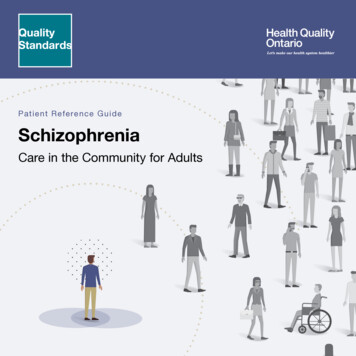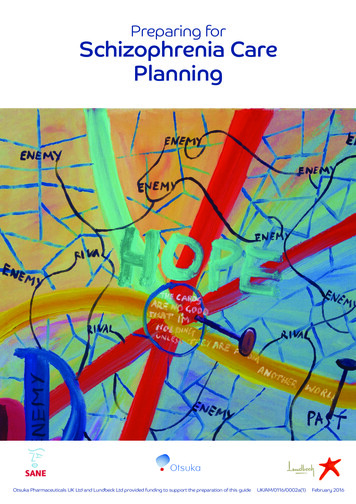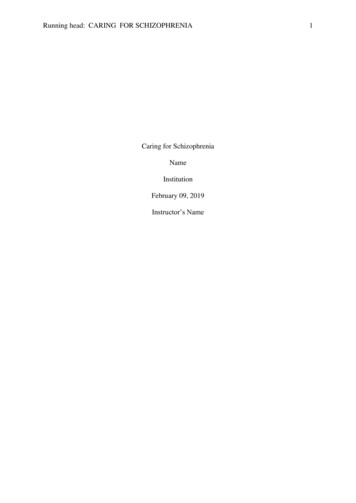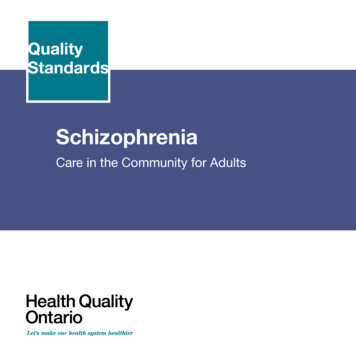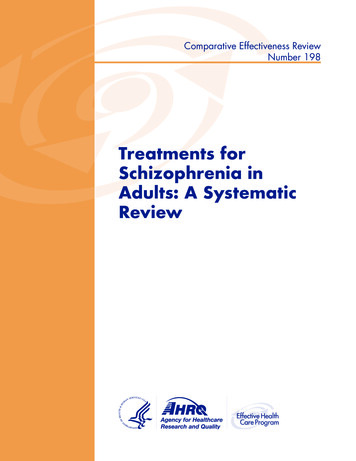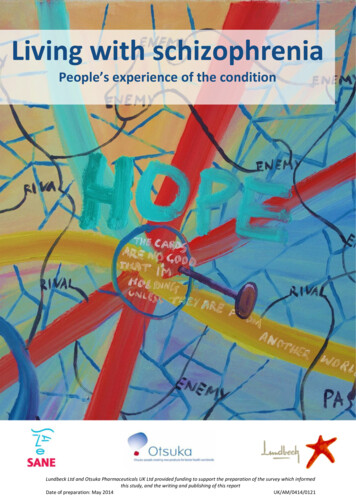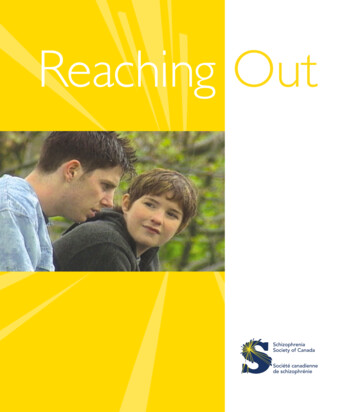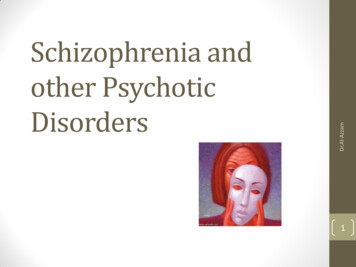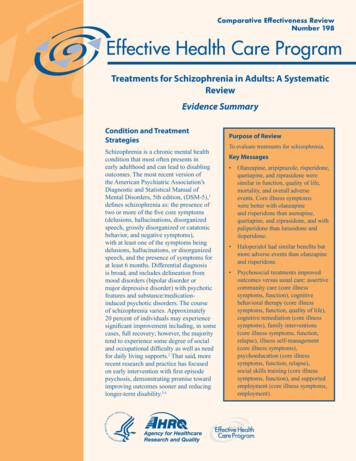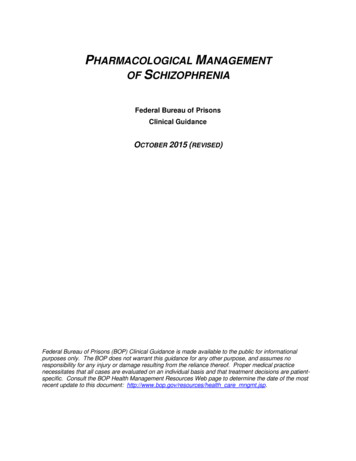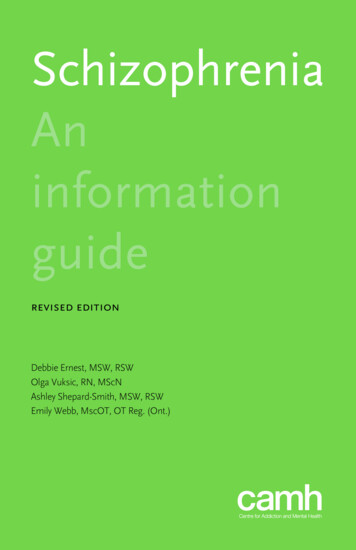
Transcription
SchizophreniaAninformationguiderevised editionDebbie Ernest, MSW, RSWOlga Vuksic, RN, MScNAshley Shepard-Smith, MSW, RSWEmily Webb, MscOT, OT Reg. (Ont.)
iSchizophreniaAninformationguideDebbie Ernest, MSW, RSWOlga Vuksic, RN, MScNAshley Shepard-Smith, MSW, RSWEmily Webb, MScOT, OT Reg. (Ont.)A Pan American Health Organization /World Health Organization Collaborating Centre
iiLibrary and Archives Canada Cataloguing in PublicationErnest, Debbie, 1970-, authorSchizophrenia : an information guide / Debbie Ernest, MSW, RSW, OlgaVuksic, RN, MScN, Ashley Shepard-Smith, MSW, RSW, Emily Webb, MScOT, OTReg. (Ont.).Includes bibliographical references.Issued in print and electronic formats.ISBN 978-1-77052-619-8 (PAPERBACK).--ISBN 978-1-77052-620-4 (PDF).--ISBN978-1-77052-621-1 (HTML).--ISBN 978-1-77052-622-8 (EPUB).--ISBN 978-1-77114235-9 (KINDLE)1. Schizophrenia. I. Vuksic, Olga, 1970-, author II. Shepard-Smith, Ashley,1986-, author III. Webb, Emily, 1985- author IV. Centre for Addiction and MentalHealth, issuing body V. Title.RC514.E76 2017C2017-904355-2616.89’8C2017-904354-4Printed in CanadaCopyright 2017 Centre for Addiction and Mental HealthNo part of this work may be reproduced or transmitted in any form or by any meanselectronic or mechanical, including photocopying and recording, or by any informationstorage and retrieval system without written permission from the publisher—except for abrief quotation (not to exceed 200 words) in a review or professional work.This publication may be available in other formats. For information about alternativeformats or other camh publications, or to place an order, please contact camhPublications:Toll-free: 1 800 661-1111Toronto: 416 595-6059E-mail: publications@camh.caOnline store: http://store.camh.caWebsite: www.camh.caDisponible en français sous le titre :La schizophrénie : Guide d’informationThis guide was produced by camh Education.3973k / 11-2017 / PM117
iiiContentsAcknowledgmentsIntroduction1vviWhat is schizophrenia? 1How does schizophrenia begin and what is its course?What are the symptoms of schizophrenia?How is schizophrenia diagnosed?Co-occurring issuesSchizophrenia and violence2What causes schizophrenia? 20Biological theoriesEnvironmental theories3Treatments for schizophrenia23The treatment teamMedicationElectroconvulsive therapyTranscranial magnetic stimulationPsychosocial therapies and supportsPeer supportComplementary approachesMedical care, physical activity and diet4 Hospital, intensive support and communitysupport 35HospitalizationIntensive supports in the communityCommunity supports5Recovery and relapse preventionWhat is recovery?The process of recoveryPromoting wellness and preventing relapsePractical aspects of recovery42
ivSchizophrenia: An information guide6Support for family and friends 49Confidentiality and legal issuesCommon concernsHow to support your family memberHow to support yourselfWorking with mental health professionals7Explaining schizophrenia to children 63Reference67Resources68
chapter titleAcknowledgmentsThe authors thank the people who shared their personal experiencesof schizophrenia with us and permitted us to include them inthis guide: Ann, Gilda, Moustafa Ragheb, Moshe Sakal and S. Wealso thank those who reviewed earlier drafts of the guide: patientand family reviewers Ann, Gilda, Moustafa Ragheb, Moshe Sakal,V.C.C. and Henry Yip; and professional reviewers April Collins,MSW, RSW; Sean A. Kidd, PhD, CPsych, CPRP; Yarissa Herman,DPsych, CPsych; Mike Pett, MSW, RSW; Gary Remington, MD,PhD, FRCPC and John Spavor, MSc (OT).We thank the authors of previous camh publications, includingother guides in this series, whose work provided a foundationfor the information presented here. Thanks in particular to JanePatterson, Dale Butterill, Claudia Tindall, David Clodman and AprilCollins, who wrote the earlier edition of this guide.Thanks finally to the camh Education team: Michelle Maynes,product developer; Nick Gamble, editor; and Mara Korkola, designer.v
viSchizophrenia: An information guideIntroductionThis guide is for people with schizophrenia, their families andfriends, and anyone else interested in better understanding the illness and what it is like to experience it.The guide should answer many of the questions you may haveabout schizophrenia. It can also help you to know what questionsto ask treatment providers. You may wish to read it from beginningto end, or to dip into it. Keep in mind, though, that some termsand concepts are explained in the opening chapters.We want the guide to promote hope, and to provide informationthat empowers people with schizophrenia, and their families, totake charge of their treatment and their lives. However, the guidealso acknowledges the challenges that schizophrenia can bring.The experience of the illness varies widely depending on theperson, the support available to them, and where they are in theirrecovery journey. The quotations we include from people withexperience of schizophrenia illustrate this range of experience.
chapter title1 What is schizophrenia?Some people say that schizophrenia is when peoplehear voices and see things that aren’t there, but for meit was different: I experienced difficult and disturbing thoughts. My thoughts made me do things or saythings that are not acceptable. At first it seemed likenothing, but then I wasn’t doing well in school, and itbecame distressing. When I went to university I startedthinking people were out to get me. I wasn’t able tofunction; I wasn’t able to carry out normal everydayactivities. — AnnSchizophrenia is a complex mental illness that affects how aperson thinks, feels, behaves and relates to others. The illnessoccurs in both men and women, but is slightly more commonin men. The first episode typically occurs in the late teens to earlytwenties—usually earlier for men than for women. People canalso develop the illness later in life. As many as one person out of100 may experience schizophrenia. At any one time, as many as51 million people worldwide experience schizophrenia, includingmore than 280,000 people in Canada.Schizophrenia can be a challenging illness to live with and tounderstand. Symptoms such as hallucinations and delusions cancause people to lose contact with reality. This experience can be1
2Schizophrenia: An information guideconfusing and distressing for the person with schizophrenia, andfor family members, friends and others, who often don’t understandwhat is happening or know how to relate to the person who is ill.People with schizophrenia may also experience changes to the waythey think and have trouble expressing themselves and managingbasic daily tasks. They may become withdrawn and isolated.Recovery from schizophrenia is a gradual process that is uniqueto each person. The symptoms usually improve and become easierto manage over time, though they do not always disappear. Arecovery-oriented approach to the treatment of schizophreniapromotes the values of hope, empowerment and optimism. Theillness can usually be managed effectively with a combination ofmedications and psychosocial supports, such as psychotherapy,education and peer support. People with schizophrenia can anddo recover, and lead meaningful and fulfilling lives.I want others to understand that it is only the worstcases that you see in the news. There are a lot of peoplewho live with it and you wouldn’t have any idea theyeven have it. We are people too. We have feelings. Wehave endless possibilities, just like anyone. — SHow does schizophrenia begin andwhat is its course?Schizophrenia often starts so gradually that people experiencingsymptoms and their families may not be aware of the illness fora long time. For some, however, the symptoms come on rapidlyand are more easily recognized. Schizophrenia has three phases:prodromal (or beginning), active and residual. These phases tendto occur in sequence and to repeat in cycles throughout the illness.The length of each phase varies from person to person.
What is schizophrenia?1. PRODROMAL PHASEWhen symptoms develop gradually, people may begin to lose interest in their regular activities and withdraw from friends and familymembers. They may become confused, have trouble concentratingand feel listless and apathetic, preferring to spend most of theirdays alone. They may also become intensely preoccupied withcertain topics or ideas (e.g., persecution, religion, public figures).Family and friends may be upset with this behaviour, not understanding that it is caused by illness. Occasionally, these symptomsreach a plateau and do not develop further but, in most cases, anactive phase of the illness follows. The prodromal period can lastweeks, months or even years.2. ACTIVE PHASEDuring the active, or acute, phase of the illness, people typicallyexperience symptoms of psychosis, such as delusions, hallucinations,jumbled thoughts, and disturbances in behaviour and feelings.However, these symptoms can also be caused by other mental andphysical health conditions (e.g., bipolar disorder, drug-inducedpsychosis, head injury), and so other factors are considered in diagnosing schizophrenia (see page 10).The active phase of schizophrenia most often appears after a prodromal period, but sometimes the symptoms can appear suddenly.3. RESIDUAL PHASEAfter an active phase, when symptoms have settled down, peoplemay be listless and withdrawn, and have trouble concentrating.The symptoms in this phase are similar to those in the prodromal phase.3
4Schizophrenia: An information guidePeople with schizophrenia may become actively ill just once ortwice in their life, or may have many episodes. Unfortunately, aftereach active phase, residual symptoms may increase and a person’sability to function normally may decrease. This is one reason it isimportant to try to avoid relapses (the return of active symptoms)by participating in the recommended treatment and recovery plan.You are a totally different person from what peopleknow you as. You just behave completely different.They see you and think: this is not the person I know.Why is he acting like this? But it’s from the illness. —MoustafaWhat are the symptoms ofschizophrenia?People with schizophrenia experience delusions; hallucinations;disorganized thought, speech or behaviour; and other symptomsthat affect their ability to function in their daily activities. Rememberthough that these symptoms are not specific to schizophrenia—they can also be signs of other mental and physical illnesses.The main symptoms of schizophrenia are divided into “positive,”“negative” and cognitive categories. People with schizophreniaoften also experience some other symptoms.POSITIVE SYMPTOMSThe term “positive” is used to describe symptoms that are “addedon” by the illness. Positive symptoms include delusions, hallucinations and disorganized thought, speech and behaviour.
What is schizophrenia?DelusionsDelusions are firmly held false beliefs that have no basis in fact orin the person’s culture. The person feels so strongly about thesebeliefs that they will not accept other people’s attempts to argueagainst or disprove the beliefs. Delusions are sometimes understood to be extreme distortions and/or misinterpretations of theperson’s perceptions or experiences. Common delusions amongpeople with schizophrenia include the beliefs that:·· other people are following or monitoring them or trying to harmthem (also referred to as paranoia)·· their bodies or thoughts are being controlled by outside forces·· ordinary events have special meaning for them (e.g., believingthat a newspaper story, song lyric or TV character is communicating special messages intended for them)·· they are especially important or have unusual powers·· other people can read their thoughts.HallucinationsHallucinations are disturbances in perception. If a person hears,sees, tastes, smells or feels something that does not actually exist,they are hallucinating. The most common hallucinations amongpeople with schizophrenia are auditory; that is, they hear noises orvoices, often talking to them or about them. These voices may beexperienced as harmless, with the voices commenting on thingsor people around the person. For some, the voices may even becomforting. However, it is more common for the voices to befrightening or humiliating, causing the person to be distressed.Voices may also be experienced as commands—ordering the personto perform some kind of action. How distressing the voices arecan depend on what the voices are saying and on the meaning theperson makes of what they are hearing.5
6Schizophrenia: An information guideDisorganized thought and speechSchizophrenia can affect a person’s ability to connect thoughts andto communicate with others in a way that is clear and logical. Theirthoughts may be jumbled or blocked, and this is expressed throughtheir speech. For example, when talking, they may:·· jump from subject to subject·· make up words that don’t make sense·· talk about ideas that seem to be unrelated·· answer questions in ways that are off-topic or irrelevant·· string together rhyming words that make no sense.Disorganized behaviourSchizophrenia can affect a person’s ability to complete everydaytasks such as bathing, local travel, basic school and work activities,buying groceries and preparing food. People with schizophreniamay be unable to plan their days and to follow through withordinary tasks.They may also behave in ways that seem unusual to others. Forexample, they may become agitated for no apparent reason, or beuninhibited in social situations.Less commonly, a person may have “catatonic” symptoms. Thesemay include rigid body posture, motionlessness, excessive repetitive movements or not reacting to their environment.For me, schizophrenia is jumbled thoughts and doingthings I would not normally do. The last time I wasadmitted to the hospital, I had thrown my furnitureout of my apartment: my bed, my tables, my TV, myradio,
Schizophrenia is a complex mental illness that affects how a person thinks, feels, behaves and relates to others. The illness occurs in both men and women, but is slightly more common in men. The first episode typically occurs in the late teens to early twenties—usually earlier for men than for women. People can also develop the illness later in life. As many as one person out of 100 may .
